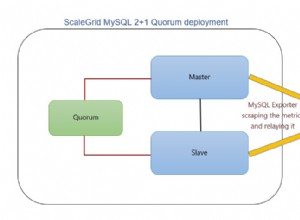Nawiąż połączenie
Najpierw musisz wymienić swój mysqli połączenie z PDO jeden (lub przynajmniej dodaj PDO połączenie obok mysqli jeden!).
// Define database connection parameters
$db_host = "127.0.0.1";
$db_name = "name_of_database";
$db_user = "user_name";
$db_pass = "user_password";
// Create a connection to the MySQL database using PDO
$pdo = new pdo(
"mysql:host={$db_host};dbname={$db_name}",
$db_user,
$db_pass,
[
PDO::ATTR_ERRMODE => PDO::ERRMODE_EXCEPTION,
PDO::ATTR_EMULATE_PREPARES => FALSE
]
);
Aktualizacja kodu
Przygotowane instrukcje z mysqli i PDO
Prawie zawsze lepiej jest używać przygotowanych instrukcji podczas umieszczania danych zmiennych w zapytaniu SQL. Jest nie tylko bezpieczniejszy (jeśli dane pochodzą z dowolnego rodzaju danych wejściowych wygenerowanych przez użytkownika), ale także ułatwia odczytywanie i wielokrotne uruchamianie z różnymi wartościami.
Przygotowane zapytanie za pomocą mysqli :
$sql = "SELECT column1, column2 FROM table WHERE column3 = ? AND column4 = ?";
$query = $mysqli->prepare($sql);
$query->bind_param("si", $string_condition, $int_condition);
$query->execute();
$query->store_result();
$query->bind_result($column1, $column2);
$query->fetch();
echo "Column1: {$column1}<br>";
echo "Column2: {$column2}";
Przygotowane zapytanie z PDO :
$sql = "SELECT column1, column2 FROM table WHERE column3 = ? AND column4 = ?";
$query = $pdo->prepare($sql);
$query->execute([$string_condition, $int_condition]);
$row = $query->fetchObject();
# $row = $query->fetch(); // Alternative to get indexed and/or associative array
echo "Column1: {$row->column1}<br>";
echo "Column2: {$row->column2}";
Zaktualizowany kod
// Using the NULL coalescing operator here is shorter than a ternary
$id = $_SESSION['u_id'] ?? NULL;
if($id) {
$sql = "SELECT email FROM users WHERE u_id = ?";
$query = $pdo->prepare($sql); // Prepare the query
$query->execute([$id]); // Bind the parameter and execute the query
$email = $query->fetchColumn(); // Return the value from the database
}
// Putting "$email" on a line by itself does nothing for your code. The only
// thing it does is generate a "Notice" if it hasn't been defined earlier in
// the code. Best use:
// - The ternary operator: $email = (isset($email)) ? $email : "";
// - The NULL coalescing operator: $email = $email ?? "";
// - OR initialize it earlier in code, before the first `if`, like: $email = "";
// N.B. Instead of "" you could use NULL or FALSE as well. Basically in this case
// anything that equates to BOOL(FALSE); so we can use them in `if` statements
// so the following (2 commented lines and 1 uncommented) are effectively
// interchangeable.
$email = $email ?? "";
# $email = $email ?? FALSE;
# $email = $email ?? NULL;
// Presumably you will also want to change this function to PDO and prepared statements?
// Although it doesn't actually do anything in the code provided?
$suggestions = selectAll($table);
// Same as with email, we're just going to use the NULL coalescing operator.
// Note: in this case you had used the third option from above - I've just
// changed it so there is less bloat.
$optionOne = $_POST['optionOne'] ?? "";
$optionTwo = $_POST['optionTwo'] ?? "";
$newSuggestion = $_POST['new-suggestion'] ?? "";
// There's no point nesting `if` statements like this when there doesn't appear to be any
// additional code executed based on the out come of each statement? Just put it into one.
// We now don't need to use empty etc. because an empty, false, or null string all.
// equate to FALSE.
if($newSuggestion && $id && $email && $optionOne && $optionTwo) {
// Not sure why you've made the the table name a variable UNLESS you have multiple tables
// with exactly the same columns etc. and need to place in different ones at different
// times. Which seems unlikely so I've just put the table name inline.
$sql = "INSERT INTO suggestions (user_id, email, option_1, option_2) VALUES (?, ?, ?, ?)";
$query = $pdo->prepare($sql);
$query->execute([$id, $email, $optionOne, $optionTwo]);
}
else{
echo "All options must be entered";
}
Bez komentarzy
$id = $_SESSION['u_id'] ?? NULL;
if($id) {
$sql = "SELECT email FROM users WHERE u_id = ?";
$query = $pdo->prepare($sql);
$query->execute([$id]);
$email = $query->fetchColumn();
}
$email = $email ?? "";
$suggestions = selectAll($table);
$optionOne = $_POST['optionOne'] ?? "";
$optionTwo = $_POST['optionTwo'] ?? "";
$newSuggestion = $_POST['new-suggestion'] ?? "";
if($newSuggestion && $id && $email && $optionOne && $optionTwo) {
$sql = "INSERT INTO suggestions (user_id, email, option_1, option_2) VALUES (?, ?, ?, ?)";
$query = $pdo->prepare($sql);
$query->execute([$id, $email, $optionOne, $optionTwo]);
}
else{
echo "All options must be entered";
}




